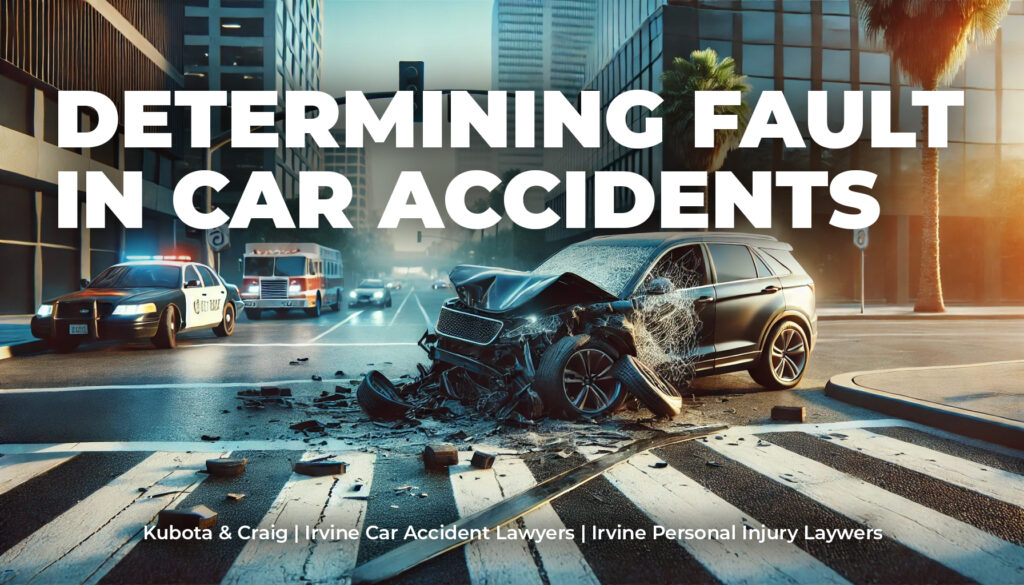Determining Fault in Auto Accidents: Navigating the Complexities of California Law
The screech of tires, the crunch of metal, and suddenly, your world is turned upside down. In the chaotic aftermath of a car accident, one question looms large: Who’s at fault? This seemingly simple question can have profound implications for your future, affecting everything from insurance claims to potential legal action.

Understanding how fault is determined in California car accidents is crucial for protecting your rights and securing the compensation you deserve. Let’s unravel the complexities of fault determination and empower you with the knowledge to navigate this challenging process.
How Fault is Determined in California Car Accidents
In California, determining fault in a car accident is a multi-faceted process that involves various factors and parties. Let’s explore the key elements that contribute to fault determination:
1. Police Reports: The Initial Assessment
When law enforcement arrives at the scene of an accident, they play a crucial role in documenting the incident and providing an initial assessment of fault.
Key aspects of police reports include:
- Detailed descriptions of the accident scene
- Statements from drivers and passengers involved
- Observations of vehicle damage and road conditions
- Preliminary conclusions about potential traffic violations
Why it matters:
Imagine you’re involved in an accident at a busy Irvine intersection. The responding officer’s report noting that the other driver ran a red light could be pivotal in establishing fault and supporting your claim.
2. Eyewitness Testimonies: Corroborating the Events
Bystanders who witnessed the accident can provide valuable, unbiased accounts of what transpired.
The importance of eyewitness testimonies include:
- Offer independent perspectives on the accident
- Can confirm or challenge the statements of involved parties
- May provide details that drivers or passengers missed
Real-world scenario:
You’re making a left turn when another vehicle strikes you. A pedestrian waiting to cross the street saw the entire incident and can confirm that you had a green arrow, supporting your version of events.
3. Traffic Laws: The Legal Framework
Violations of California traffic laws often play a significant role in determining fault.
Common traffic violations that may indicate fault:
- Running red lights or stop signs
- Speeding
- Failure to yield right-of-way
- Improper lane changes or turns
Practical application:
If you’re rear-ended while stopped at a red light, the other driver’s failure to maintain a safe following distance clearly violates traffic laws, pointing to their fault in the accident.
4. Accident Reconstruction: Expert Analysis
In complex cases, accident reconstruction experts may be called upon to analyze the evidence and determine how the accident occurred.
What accident reconstruction involves:
- Examining vehicle damage patterns
- Analyzing skid marks and debris patterns
- Considering road conditions and weather factors
- Using advanced software to simulate the accident
Why it’s crucial:
In a multi-vehicle pileup on the freeway, accident reconstruction can help determine which driver’s actions initiated the chain reaction, crucial information for assigning fault and liability.
5. Insurance Adjusters: The Final Assessment
Insurance company adjusters review all available evidence to assign fault percentages for claims purposes.
The role of insurance adjusters:
- Evaluate police reports, witness statements, and other evidence
- Consider expert opinions and accident reconstruction findings
- Assign fault percentages based on California’s comparative negligence laws
Impact on your claim:
If you’re found to be 20% at fault for an accident, your potential compensation could be reduced by that percentage. Understanding this process can help you challenge unfair fault assignments and protect your right to full compensation.
Protecting Your Rights After a Car Accident
Determining fault in a car accident is a complex process with significant implications for your recovery and financial well-being. While understanding these factors is important, navigating the legal and insurance landscape can be overwhelming, especially when you’re dealing with injuries or property damage.
At Kubota & Craig, our experienced car accident attorneys in Irvine are dedicated to helping you through every step of this challenging process. We have the expertise to:
- Analyze police reports and gather additional evidence
- Interview witnesses and consult with accident reconstruction experts
- Challenge unfair fault determinations by insurance companies
- Negotiate with insurers to ensure you receive fair compensation
- Represent your interests in court if necessary
Don’t let confusion about fault determination jeopardize your right to compensation. If you’ve been involved in a car accident in Irvine or anywhere in Orange County, contact our skilled Irvine car accident lawyers for a free consultation. We’ll help you understand your rights, navigate the complexities of fault determination, and fight for the compensation you deserve.
Remember, time is of the essence in car accident cases. Reach out to Kubota & Craig today and let us put our expertise to work for you.
Learn more about the insurance claim process after a car accident.
To learn more about issues related to car accidents and legal issues surrounding car accidents, be sure to check out the following articles we’ve prepared for you:

